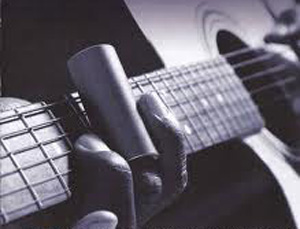bottleneck, slide, and slide guitar

A bottleneck is a glass or metal tube that fits over a guitarist's finger – usually the ring finger or little finger – and stops the strings of the guitar when it is slid up or down the instrument's fingerboard. Originally, the glass tube was the neck of a bottle that had been broken off and sanded down for use by blues guitarists.
Strictly speaking, "bottleneck" refers to glass and "slide" refers to metal, but the terms are often used interchangeably. The corresponding guitar style, known as slide guitar, makes possible effects, including glissandos, voice-like cries, and notes between the frets, which aren't available in conventional guitar playing.
Glass slides produce a smoother sound; metal slides are louder. The use of different fingers also produces different sounds. An advantage of putting the bottleneck on the pinky is that it leaves the first three fingers free to hold down chords.
A guitar with a high action is best for slide since it reduces the likelihood of fret buzz. The slide merely rests on the strings; it is not used to press the strings down to the frets. For this reason, it should come to rest directly over the frets, not slightly behind them.
Many of the most effective slide guitar effects are created with open or dropped tunings, which allow whole chords to be slid up or down.
History of the slide guitar
The slide guitar style had its origins in African one-stringed instruments and also Hawaiian guitar styles, which were introduced to the southern US by Hawaiian soldiers during the Spanish-American War. It developed during the era of black slavery, in and around the Mississippi delta, at the same time as the blues. Due to the Hawaiian influence, the first slide players laid their guitars flat across their lap, and used any suitable object, such as a cigar tube or broken bottle neck, as a makeshift slide.
The techniques of slide guitar were pioneered by several important early blues men, including Charley Patton, Eddie "Son" House, Big Joe Williams, and Leadbelly, and passed on to the next generation of blues guitarists, such as Muddy Waters, Robert Johnson, and Elmore James. These players then took slide playing into the electric blues era and influenced rock guitarists like Eric Clapton, Duane Allman, and Rory Gallagher.


